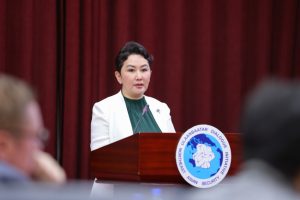Mongolia hosted the Ninth Ulaanbaatar Dialogue on Northeast Asian Security from June 6 to 7. Each year, the UB Dialogue, an international conference jointly organized by the Ministry of Foreign Affairs and the Institute of Strategic Studies under Mongolia’s National Security Council, aims to shed light on the emerging challenges and opportunities in regional cooperation in diverse sectors. Given Northeast Asia’s current geopolitical environment and accelerating trends in tackling climate change, energy transition, critical minerals, and environmental topics were highlights of this year’s conference.
The 2024 Ulaanbaatar Dialogue was organized under five themes: 1) Security Challenges and Opportunities in the Region, 2) Multilateral Cooperation in Northeast Asia, 3) Climate Change and Security Challenges in Northeast Asia, 4) Secure and Affordable Energy Transition in Northeast Asia, and 5) Developing Sustainable and Resilient Value Chains for Critical Energy Transition Minerals. These topics not only touch on the current stage of bilateral and multilateral partnerships, but also inspire additional cooperation opportunities, particularly in energy transition, climate change, and the critical mineral sector.
All these sectors are crucial for Mongolia’s own strategy to bolster economic activities along with affordable energy diversification.
This year’s conference included 200 participants, including analysts from a variety of international think tanks, academics, and government representatives.
One notable element in this year’s UB Dialogue was the increasing participation of Mongolia’s European partners. All three Baltic states – Estonia, Latvia, and Lithuania – participated while the United Kingdom, France, and Belgium sent delegations. In addition, Finland, Switzerland, and Sweden’s participation underlined the regional tensions concerning the Russia-Ukraine War and increasing security issues concerning the Korean Peninsula.
Dan Chugg, the director for Northeast Asia and China at the U.K. Foreign, Commonwealth and Development Office, speaking from Sukhbaatar Square in Ulaanbaatar, highlighted the United Kingdom’s continued participation in the UB Dialogue since 2013. This year, he stated, “The U.K. is keen on forwarding particular issues on security, climate change, and energy transition.”
The U.K. ambassador to Mongolia, Fiona Blyth, made similar remarks in a recent interview with The Diplomat. She stated, “Mongolia should and can take advantage of the global trend in clean energy and diversified energy sources. Now is the time to transition while there is so much interest, abilities, and knowledge.”
Moreover, the conference also had participants from Russia, China, South Korea, Japan, Kazakhstan, and more. It is crucial for the future of the UB Dialogue to have the active participation of regional actors. This year, North Korea did not send any representatives.
With diverse participants and observers, the UB Dialogue has become an important venue. It serves as a peace mechanism that gathers not only Mongolia’s partners but also states that have diverging interests or conflicts with one another. The UB Dialogue, in essence, hopes to keep lines of communication open between regional actors as a way to avoid misunderstanding and miscommunication that could lead to a conflict.
Dr. Mendee Jargalsaikhan, director of the Institute of Strategic Studies, told Montsame, a Mongolian news agency, “The fact that we are having this conference is a tangible result itself.” He added, “This conference does not aim to settle disputes or conflicts between the countries in the region. Instead, countries in conflict should use this opportunity to increase understanding and build mutual trust.”
Through building trust, regional issues can be solved. Countries can also increase bilateral and multilateral cooperation and tackle looming issues in critical sectors such as energy, the economy, and the environment.
In Northeast Asia, the clean energy transition bestows tremendous opportunities but will also require a sustainable mechanism that does not fully replace the old system but manages both, in a slow transition. This is also crucial for Mongolia’s approach to diversifying its energy sources in a cleaner environment.
The UB Dialogue also created opportunities for sideline conversations and bilateral agreements. Mongolian Foreign Minister Battsetseg Batmunkh received the secretary general of France’s Ministry of European and Foreign Affairs, Anne-Marie Descôtes, on the sidelines of the Dialogue and held a bilateral meeting. The two sides discussed the implementation of 2023-2028 cooperation plans. France is one of Mongolia’s third neighbors that has shown interest in developing its uranium deposits.
On the multilateral front, the Ulaanbaatar Dialogue has been one international conference that supports a peaceful and open dialogue on extremely challenging topics such as the denuclearization of North Korea, and the overall security issues in the Korean Peninsula, which also involves the United States. Mongolia believes that these security challenges cannot be solved without trust, open dialogue, and continued efforts from all parties.
Glyn Ford, a former member of the European Parliament and the founder and director of Track2Asia, which organizes informal dialogues between Europe and East Asia, highlighted the importance of the UB Dialogue given the current re-emergence of bloc politics – “some would say a new Cold War.”
“One of the reasons I’m here, one of the reasons I appreciate the work of the Ulaanbaatar Dialogue, is it’s trying to bring people together rather than separate them,” Ford told Mongolian media. “I certainly think that, in terms of the Korean Peninsula, a ‘neutral’ country like Mongolia is probably going to do more to help us bridge the gap and get people talking than if you want statements out of Washington and Pyongyang.”
The 2025 UB Dialogue will be the 10th edition of the annual gathering. It was first launched in 2014, but missed two years (2020 and 2021) during the pandemic.

































